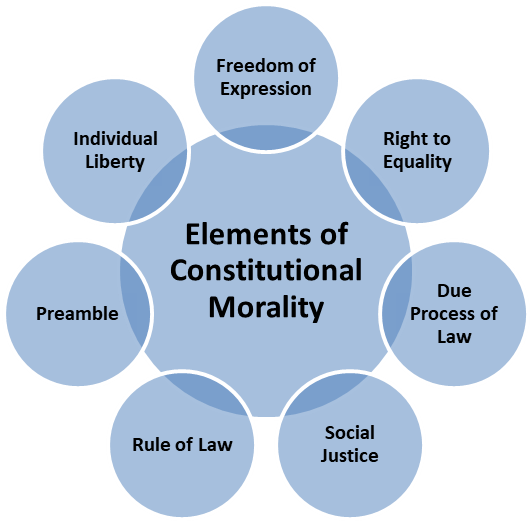Ahmedabad
(Head Office)Address : 506, 3rd EYE THREE (III), Opp. Induben Khakhrawala, Girish Cold Drink Cross Road, CG Road, Navrangpura, Ahmedabad, 380009.
Mobile : 8469231587 / 9586028957
Telephone : 079-40098991
E-mail: dics.upsc@gmail.com

Constitutional Morality
News: The Allahabad High Court judgment in Kiran Rawat vs State of UP is being seen as violating constitutional morality regarding denial of the protection to an inter-faith couple in a live-in relationship from police harassment.
Background:
• The judgement negates the idea of constitutional morality in personal relations, which the Supreme Court of India has repeatedly affirmed.
• The High Court judgment implied that the live-in relationship is a “social problem”.
What is Constitutional Morality?
• Constitutional morality is a term that refers to the adherence to the core principles of constitutional democracy. It means to follow not only the letter but also the spirit of the Constitution, which is based on
values such as individual autonomy, liberty, equality, dignity, privacy, social justice, rule of law, etc.
What is the significance of Constitutional morality?
• It protects personal liberty, individual autonomy and limits the state’s power to regulate or punish based on social morality.
• It fosters a culture of tolerance, respect, and dialogue among different groups and communities.
• It prevents imposition of religious or cultural norms on individuals who do not voluntarily accept them.
What are important Supreme court verdicts on Constitutional morality?
• Lata Singh vs State of UP (2006) – The court directed protection for inter-caste and interreligious couples from harassment and violence.
• Joseph Shine vs Union of India (2018) - The Court decriminalized adultery as defined under Section 497 of the Indian Penal Code (IPC).
• In Navtej Singh Johar v. Union of India (2018), the court decriminalized homosexuality and affirmed the rights of LGBTQ+ persons based on constitutional morality.
• Shakti Vahini vs Union of India (2018) – It condemned honour killings and violence against inter-caste and inter-religious couples.
What are the challenges?
• No comprehensive definition of what Constitutional morality means.
• Conflicts between popular morality and religious beliefs may lead to social unrest in the society. For example, The Sabrimala case.
• Constitutional morality promotes judicial supremacy, which can result in the Judiciary intervening in the functioning of the legislature.
• Political influence is a challenge that undermines the legitimacy of constitutional morality.
Way Forward
• Promoting public awareness and education about constitutional morality is important.
• Ensure judicial restraint and follow the principles underlining Doctrine of Separation of Powers.
• Constitutional morality should be flexible and adaptive to evolving societal norms, values, and challenges.

Address : 506, 3rd EYE THREE (III), Opp. Induben Khakhrawala, Girish Cold Drink Cross Road, CG Road, Navrangpura, Ahmedabad, 380009.
Mobile : 8469231587 / 9586028957
Telephone : 079-40098991
E-mail: dics.upsc@gmail.com
Address: A-306, The Landmark, Urjanagar-1, Opp. Spicy Street, Kudasan – Por Road, Kudasan, Gandhinagar – 382421
Mobile : 9723832444 / 9723932444
E-mail: dics.gnagar@gmail.com
Address: 2nd Floor, 9 Shivali Society, L&T Circle, opp. Ratri Bazar, Karelibaugh, Vadodara, 390018
Mobile : 9725692037 / 9725692054
E-mail: dics.vadodara@gmail.com
Address: 403, Raj Victoria, Opp. Pal Walkway, Near Galaxy Circle, Pal, Surat-394510
Mobile : 8401031583 / 8401031587
E-mail: dics.surat@gmail.com
Address: 303,305 K 158 Complex Above Magson, Sindhubhavan Road Ahmedabad-380059
Mobile : 9974751177 / 8469231587
E-mail: dicssbr@gmail.com
Address: 57/17, 2nd Floor, Old Rajinder Nagar Market, Bada Bazaar Marg, Delhi-60
Mobile : 9104830862 / 9104830865
E-mail: dics.newdelhi@gmail.com